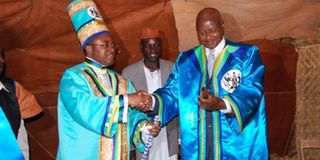Why Yiira republic is not a feasible venture

Rwenzururu king Charles Wesley Mumbere shaking hands with president Museveni at a recent coronation ceremony. File photo
In regard to clashes in Rwenzori sub-region, Uganda reserves the right to defend her sovereignty, territorial boundaries and national integrity. UPDF which started as ragtag rebel fighters is not naïve about stages of armed rebellions and acted swiftly. Many countries have exercised their legitimate rights to fight separatists. What came into question was not war per se, but war crimes committed during conflicts. Russia launched war to stop the breakaway of Chechnya.
Similar fate befell the Tamil Tigers defeated by the Srilankan government.
Second, the creation of a state within a state must be justified.
South Sudan created in 2011 is the world’s youngest nation. The UN sanctioned the split from Arab north after unending conflict. The two Sudans have distinct racial, cultural and religious differences, therefore perpetually incompatible. The Bakonzo, however, are not the only ethnic group that straddles across national boundaries. The Alur, the Iteso, Sabiny, Samia, Luo et al fall into the same category, making the Rwenzururu cause for breakaway nugatory.
Third relatively, there must be sizeable population with viable resources for the creation of a thriving state. South Sudan had a large population with oil reserves to provide revenue and attract foreign investments besides land, water, wildlife and others. The population of a Yiira republic is undefined and Kasese as a victim of present day flooding lacks capacity to sustain itself. Besides being sandwiched between Uganda and DR Congo limits survival without routes to the sea. Yiira republic can never be a member of the East African Community neither can it partner with DR Congo after breaking away from it.
It is bound to face the wrath of the UN force in Congo – MONUSCO just like the ADF and M23 rebels. The suicidal venture is destined to suffocation at a time when nations strive to form economic and security blocs to thrive in a highly competitive world.
Fourth, before attaining independence, developing nations were mentored by the colonialists. The British policy of indirect rule gave the host nations opportunities to govern themselves before independence. Nationals were recruited in civil service, police and the army and participated during world wars. South Sudan which had no such opportunity has failed to take-off and is embroiled in sectarian struggles between the Dinka’s Salva Kirr and Nuer’s Riek Machar. A cultural institution whose leader and cabinet are political novices will face a far worse situation.
Finally, the Yiira separatists probably didn’t see the possibility of fighting the army alone and hoped for foreign intervention. Of late, NATO’s role in Libya and activities of the ICC are used by some politicians to blindfold supporters to confront security forces. Yet LRA’s Dominic Ongwen though tried at Hague, lives in a better environment than his victims and at worst destined to face life imprisonment.
Charles Okecha,
St. Paul’s College, Mbale




